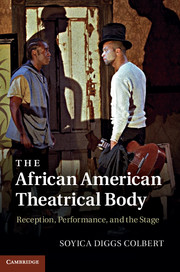Book contents
- Frontmatter
- Contents
- Illustrations
- Acknowledgements
- Overture: rites of reparation
- Chapter 1 Repetition/reproduction: the DNA of black expressive culture
- Chapter 2 Recuperating black diasporic history
- Chapter 3 Reenacting the Harlem Renaissance
- Chapter 4 Resisting shame and offering praise and worship
- Chapter 5 Resisting death: the blues bravado of a ghost
- Chapter 6 Rituals of repair
- Chapter 7 Reconstitution
- Epilogue Black movements
- Notes
- Bibliography
- Index
Chapter 6 - Rituals of repair
Amiri Baraka's Slave Ship and August Wilson's Joe Turner's Come and Gone
Published online by Cambridge University Press: 05 November 2011
- Frontmatter
- Contents
- Illustrations
- Acknowledgements
- Overture: rites of reparation
- Chapter 1 Repetition/reproduction: the DNA of black expressive culture
- Chapter 2 Recuperating black diasporic history
- Chapter 3 Reenacting the Harlem Renaissance
- Chapter 4 Resisting shame and offering praise and worship
- Chapter 5 Resisting death: the blues bravado of a ghost
- Chapter 6 Rituals of repair
- Chapter 7 Reconstitution
- Epilogue Black movements
- Notes
- Bibliography
- Index
Summary
Some things you forget. Other things you never do . . . Places, places are still there. If a house burns down, it's gone, but the place – the picture of it – stays, and not just in my rememory, but out there in the world.
Toni Morrison, BelovedAugust Wilson's Joe Turner's Come and Gone depicts Herald Loomis' search for his song – his purpose in life. His quest, posited as a search for his estranged wife Martha Pentecost, carries him to distant places and necessitates unexpected encounters. In act i, Loomis describes the circumstances that separated him from his wife, recalling how Joe Turner, “brother of the Governor of the great sovereign state of Tennessee, swooped down,” kidnapped him, and kept him for seven years. Similarly to many tales of existential crisis, Loomis' narrative features a traumatic event that creates a detour from what he perceives as his predetermined path. Once released, Loomis tries to locate his family but only finds his daughter, being cared for by his mother-in-law. He resumes his position as caregiver and continues to look for his wife, a search that draws him to Seth Holly's boarding house in Pittsburgh, 1911. Through the constant turnover endemic to a boarding house, the setting of the play incorporates mutability in the seemingly stable materiality of the stage set. The individuals who reside in the house contribute to its material properties – the things that make it a boarding house. Therefore, when the boarders change so too do the material conditions of the setting of the play. The malleable nature of the setting foregrounds the way the play as a whole will draw into question some of the basic tenets of setting in realist drama.
The setting also enables unlikely collaborations. As a resident in the boarding house, Loomis meets the other central character of the play, Bynum Walker, a man in his sixties who performs rituals and is known throughout the community to be a conjurer. Loomis, whose tragic upheaval by Joe Turner renders him agnostic, must collaborate with Bynum and Martha in order to find his voice. Marked by Loomis' resistance throughout, their ritualistic collaborations create as much dissonance as harmony and may equally qualify as confrontations. Nevertheless, in this chapter I deploy the language of collaboration to distinguish reparative work as arduous. The ostensibly antithetical phrase “collaborative confrontations” further specifies the nature of repair staged in Joe Turner's Come and Gone. The play features conflicts whose resolutions require uneasy alliances. Bynum plays an important role in the first two collaborative confrontations that structure the play, while Martha incites the third. Collectively, the altercations allow Loomis to find what he categorizes as his “starting place in the world” (72).
- Type
- Chapter
- Information
- The African American Theatrical BodyReception, Performance, and the Stage, pp. 194 - 230Publisher: Cambridge University PressPrint publication year: 2011

